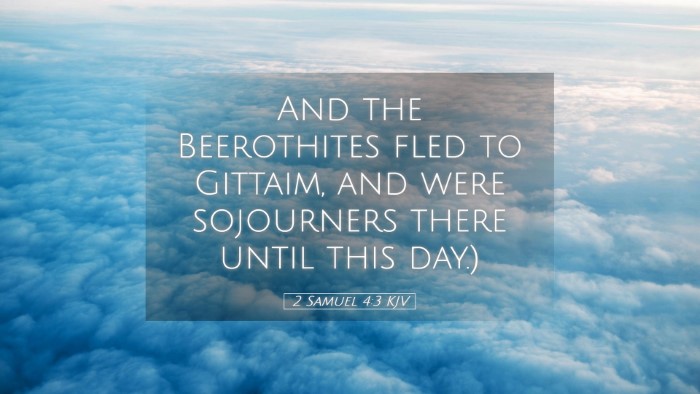Old Testament
Genesis Exodus Leviticus Numbers Deuteronomy Joshua Judges Ruth 1 Samuel 2 Samuel 1 Kings 2 Kings 1 Chronicles 2 Chronicles Ezra Nehemiah Esther Job Psalms Proverbs Ecclesiastes Song of Solomon Isaiah Jeremiah Lamentations Ezekiel Daniel Hosea Joel Amos Obadiah Jonah Micah Nahum Habakkuk Zephaniah Haggai Zechariah Malachi2 Samuel 4:3
2 Samuel 4:3 KJV
And the Beerothites fled to Gittaim, and were sojourners there until this day.)
2 Samuel 4:3 Bible Commentary
Commentary on 2 Samuel 4:3
Bible Verse: 2 Samuel 4:3 - "And the Berothites fled to Gittaim, and were sojourners there unto this day."
Context of the Verse
This verse appears within a tumultuous period in Israel’s history, following the death of Saul and the transition of power from Saul’s lineage to David. The Berothites, descendants of Benjamin, faced significant upheaval as factions arose and David’s rule began to solidify.
Insights from Public Domain Commentaries
Matthew Henry's Commentary
Matthew Henry offers a detailed overview of the socio-political climate surrounding this verse. He asserts that the Berothites were originally loyal to Saul, but following the events culminating in the upheaval after Saul's death, their loyalty became precarious.
Henry highlights that the act of fleeing to Gittaim represents a significant survival mechanism in the face of potential retribution for their association with Saul. Their migration indicates a shift in power dynamics and the need for preservation amidst changing allegiances.
Albert Barnes' Notes on the Bible
Albert Barnes further expands on the geographical significance of Gittaim, noting that it was a place of refuge. His commentary emphasizes the importance of this location as a haven for those in fear of their lives. By relocating, the Berothites sought security in an unstable environment.
Barnes also points out that the Berothites' decision to sojourn in Gittaim underscores their adaptability and resilience. This verse is more than geographical; it illustrates the fragility of alliances during a violent struggle for power.
Adam Clarke's Commentary
Adam Clarke provides a culturally rich interpretation by commenting on the original inhabitants of Beroth and the implications of their flight. Clarke notes that Beroth was one of the cities of Benjamin, and its inhabitants faced existential peril. He posits that their flight signifies a break from their original loyalties and necessitates a re-evaluation of identity among the Israelite tribes.
Clarke also emphasizes that the term "sojourners" reflects not just a physical act of dwelling but a deeper sense of displacement, indicating the psychological impact of the war among kingdoms. Their status as sojourners symbolizes the broader theme of uncertainty in the narrative of 2 Samuel.
Theological Reflections
The flight of the Berothites from their homeland serves as an evocative metaphor for the journey of faith and the challenges faced by those aligned with God during tumultuous times. The Berothites' experience resonates with themes of displacement, identity, and the quest for security that are prevalent throughout Scripture.
- Displacement and Belonging: The sojourners' status reflects a deeper spiritual reality. Many believers experience periods of displacement in their spiritual journey, feeling torn between past affiliations and new covenantal commitments.
- The Quest for Refuge: Just as the Berothites sought refuge in Gittaim, believers today look to God as their ultimate refuge amidst the chaos of life. Psalm 46:1 elucidates this idea, presenting God as a “very present help in trouble.”
- The Change of Allegiances: The Berothites' move represents a significant transition in loyalties. Spiritual growth often demands a similar realignment of allegiances—from past practices and affiliations to a dedicated commitment to follow God’s ways. This concept invites deep reflection for believers navigating faith transitions.
Conclusion
2 Samuel 4:3 encapsulates a moment of profound significance in the historical narrative of Israel. Through the eyes of the Berothites, we are challenged to consider our own journeys, allegiances, and the need for refuge amidst life’s upheavals. Insights gleaned from respected commentators like Matthew Henry, Albert Barnes, and Adam Clarke encourage readers to engage deeply with the text, fostering a richer understanding of its implications both historically and theologically.


